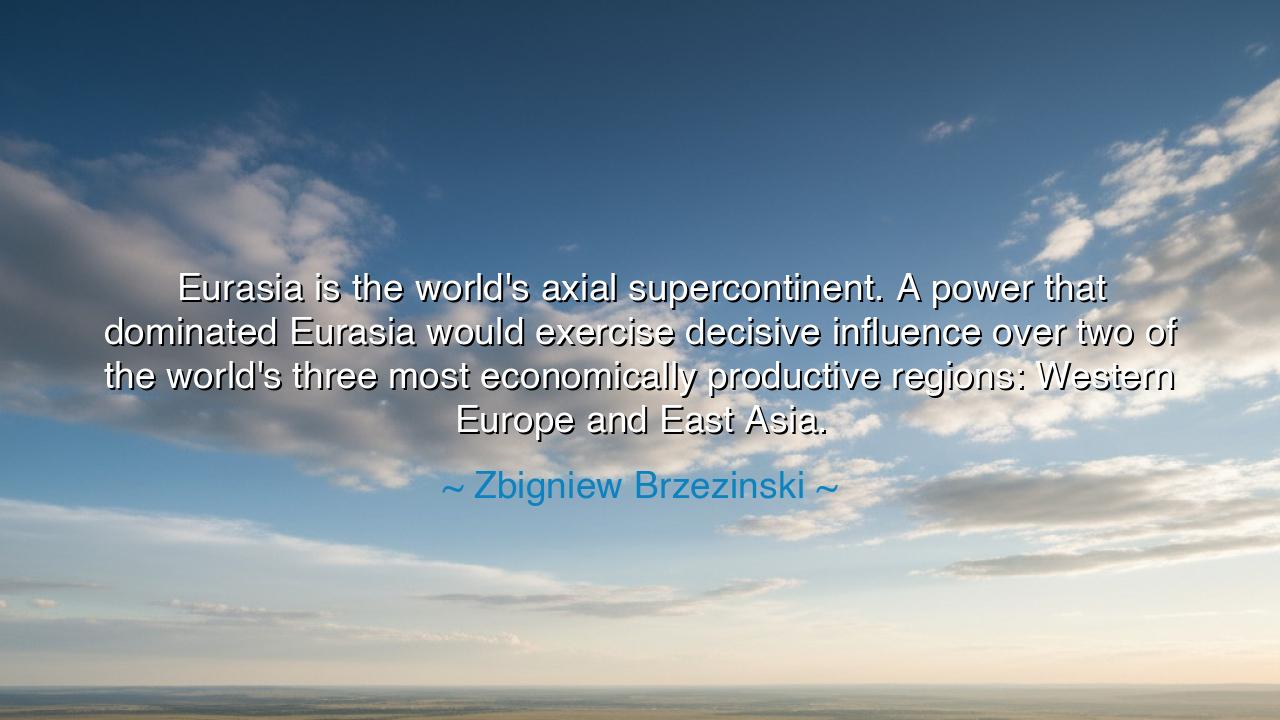
Eurasia is the world's axial supercontinent. A power that
Eurasia is the world's axial supercontinent. A power that dominated Eurasia would exercise decisive influence over two of the world's three most economically productive regions: Western Europe and East Asia.






Hearken, children of the ages, to the astute words of Zbigniew Brzezinski, who proclaimed: “Eurasia is the world's axial supercontinent. A power that dominated Eurasia would exercise decisive influence over two of the world's three most economically productive regions: Western Europe and East Asia.” In these words lies the enduring truth of geography, strategy, and the distribution of power. The vast expanse of Eurasia, bridging East and West, holds within it the keys to commerce, culture, and dominion; he who controls its heart wields influence over the fortunes of nations and the flow of history itself.
Brzezinski teaches that power is inseparable from position and reach. Control over critical territories confers not only military advantage but also economic leverage, shaping the destinies of regions far beyond their borders. Eurasia’s breadth encompasses the engines of wealth and innovation: Western Europe, with its long history of commerce and industry, and East Asia, a cradle of ingenuity and production. Dominion over the continent translates to decisive influence over the world’s prosperity and order.
Consider the life of Genghis Khan, whose Mongol hordes traversed Eurasia with unmatched speed and strategy. By uniting vast lands under his command, he controlled key trade routes, connected distant economies, and imposed order across diverse peoples. His dominance of Eurasia allowed him to influence regions far from his homeland, demonstrating Brzezinski’s insight: the command of the axial supercontinent shapes the fate of economically and politically vital territories.
The ancients themselves recognized the power of geography. Thucydides, in the councils of Athens, and Sun Tzu, in the fields of war, taught that control of strategic lands and corridors determines the flow of wealth and the exercise of influence. Brzezinski’s reflection echoes this timeless principle: dominion over the heart of the land confers leverage unmatched by mere numbers or ambition alone, for the landscape itself shapes opportunity and authority.
Thus, his counsel is both observation and warning: the ambition of powers must reckon with the geography of Eurasia, for the supercontinent’s vast resources, networks, and populations render it the pivotal arena of influence. To neglect its strategic significance is to underestimate the forces that govern commerce, culture, and political destiny.
Carry this teaching, children of generations yet unborn: understand that geography is destiny, and that the control of central lands carries consequences far beyond the eye’s horizon. In wisdom lies the recognition that influence over Eurasia is not mere conquest—it is mastery of the axes of wealth, power, and human enterprise, shaping the fate of the known world for generations to come.






CTDa Co Ten
Brzezinski’s insight feels chillingly pragmatic. It reminds me how geography still dictates ambition, even in an era that celebrates globalization. But I wonder whether economic interdependence now blunts the old logic of dominance. If Western Europe and East Asia are deeply connected through trade, does any nation benefit from unilateral control? The quote highlights how old power dynamics persist—but perhaps they need rethinking for a truly globalized age.
KCNguyen kim chi
Reading this makes me reflect on the historical roots of power—the echoes of Mackinder’s Heartland Theory come to mind. Eurasia has always been the pivot of global strategy, from empires to modern superpowers. But in an age of global supply chains and climate challenges, does control over physical space still confer the same leverage? Maybe the new ‘supercontinent’ of influence is digital, transcending traditional boundaries altogether.
HHhung hihi
This statement feels like a geopolitical warning as much as an analysis. If controlling Eurasia equates to controlling the world’s wealth centers, then competition for influence there could easily escalate into global conflict. It makes me question whether Brzezinski’s view encourages balance of power politics over cooperative frameworks. Is dominance still the goal, or should the focus shift toward shared stewardship of such interconnected regions?
LPLinh Pham
I find this quote fascinating because it frames global politics in such stark geographic terms. It makes me think about how the idea of Eurasia as a single strategic theater continues to influence policy—especially for powers like the U.S., Russia, and China. But does this vision risk oversimplifying the complexity of modern alliances and economies? In a multipolar world, can any one state truly ‘dominate’ such a vast, diverse continent?
DTDung Tien
This observation underscores the enduring geopolitical truth that geography shapes power. It makes me wonder whether control over Eurasia remains as decisive today in a globalized, digitally connected world. With cyber influence, trade networks, and space technology now defining strength, does territorial dominance still matter as much? Brzezinski’s logic is rooted in the 20th century balance of power, but perhaps the modern ‘axis’ of influence lies more in data than in land.